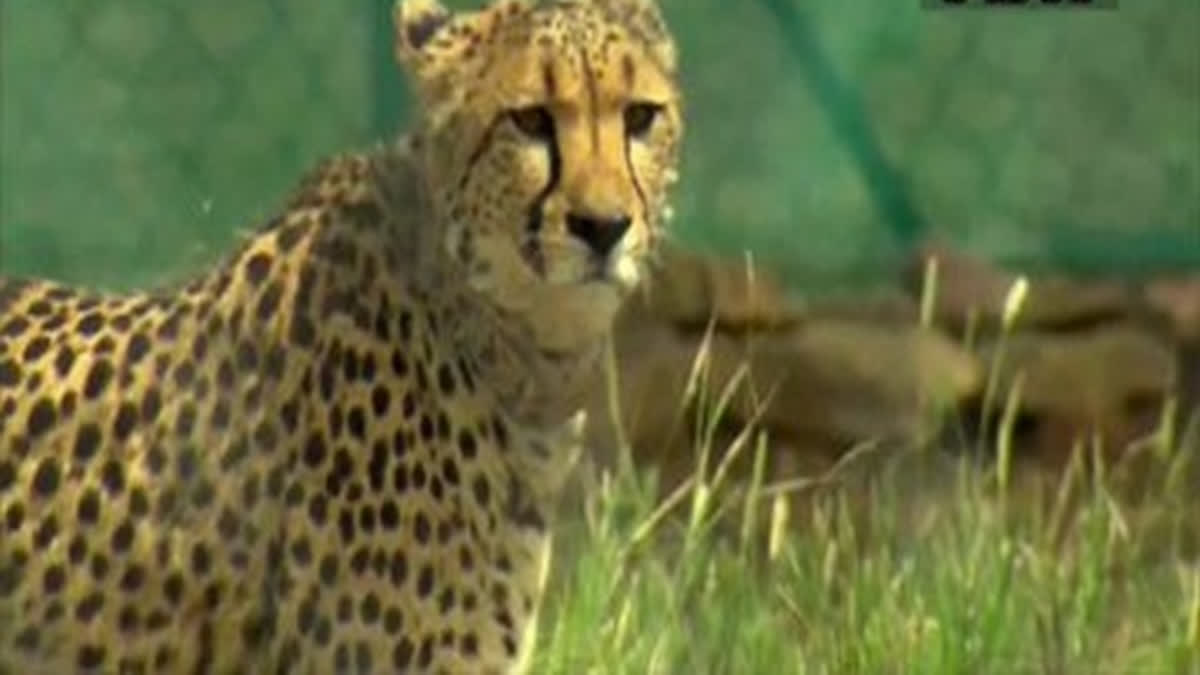New Delhi: The Namibian Cheetahs that were released in Madhya Pradesh's Kuno National Park were renamed following a call by Prime Minister Narendra Modi to the people to come up with suggestions.
This comes after PM Modi in his Mann Ki Baat on September 25 2022, had urged the citizens to come up with suggestions for cheetahs reintroduced from Namibia and South Africa, with an intention to popularize and sensitize the general public about Project Cheetah.
In this regard, a competition was organized on the Government of India platform mygov.in from September 26 to October 31, 2022. In response, a total of 11,565 entries were received suggesting new names for reintroduced cheetahs, an official statement said on Thursday.
Namibian Cheetah's old name was Asha (female) and her new name is Aasha, and of another cheetah, his old name was Oban (Male) and now his new name is Pavan.
South Africa Cheetah whose old name was Phinda and the new name is Daksha and of another Cheetah's name was Mapesu and whose new name is Nirva. The names of the remaining Cheetah have also changed. The entries were scrutinized by a selection committee and based on the significance and relevance of the suggested names for their conservation and cultural value the following new names have been selected for Namibian and South African cheetahs.
The Ministry of Environment, Forest and Climate Change congratulated the winners of the competition who suggested new names for Namibian and South African cheetahs.
The last cheetahs in the Indian wilderness were recorded in 1947 when three cheetahs were shot in the Sal (Shorea robusta) forests of Koriya District, Chhattisgarh State. The main reasons for the decline of cheetahs in India were large-scale capture of animals from the wild for coursing, bounty and sport hunting, extensive habitat conversion with a consequent decline in prey base and in 1952 Cheetahs were declared extinct.
The goal of the Cheetah Introduction project in India was to establish viable cheetah metapopulation in India that allows the cheetah to perform its functional role as a top predator and provide space for the expansion of the cheetah within its historic range thereby contributing to its global conservation efforts.
The major objectives of the introduction project were to establish breeding cheetah populations in safe habitats across its historic range and manage them as a metapopulation.
To use the cheetah as a charismatic flagship and umbrella species to garner resources for restoring open forest and savanna systems that will benefit biodiversity and ecosystem services from these ecosystems, to use the ensuing opportunity for eco-development and eco-tourism to enhance local community livelihoods and to manage any conflict by cheetah or other wildlife with local communities within cheetah conservation areas expediently through compensation, awareness, and management action.
In this context, the Government of India initiated G2G consultative meetings with the Republic of Namibia which culminated in the signing of the MoU between the two countries on July 20, 2022, for cheetah conservation.
Following the signing of the MoU, in a historic first wild-to-wild intercontinental translocation, eight cheetahs were transported from Namibia to India on September 17, 2022, and were released into the quarantine bomas by PM Modi.
As per the Action Plan for Cheetah Introduction in India, annually 10-12 cheetahs are required to be imported from African countries for the next 5 years at least. In this context, the Government of India initiated bilateral negotiations with the Republic of South Africa in 2021 for cooperation in the field of Cheetah conservation.
The negotiations were successfully concluded with the signing of an MoU with the Republic of South Africa in January 2023. Under the provisions of the MoU, a first batch of 12 cheetahs (7 males, 5 females) were translocated from South Africa to India on February 17, 2023. The translocation of 12 cheetahs from South Africa to Gwalior and onwards to Kuno National Park through Helicopters was executed by the Indian Air Force.
A delegation of cheetah experts, veterinarians and senior officials accompanied the cheetahs during the transcontinental translocation exercise. To take India's ambitious project on Cheetah Introduction forward, a consultative workshop involving international cheetah experts, scientists, veterinarians, and forest officials was also organised on February 20, 2023, at Kuno National Park. The outcome of the workshop paved a way for better cheetah management which will help in successfully establishing cheetah metapopulation in India.



